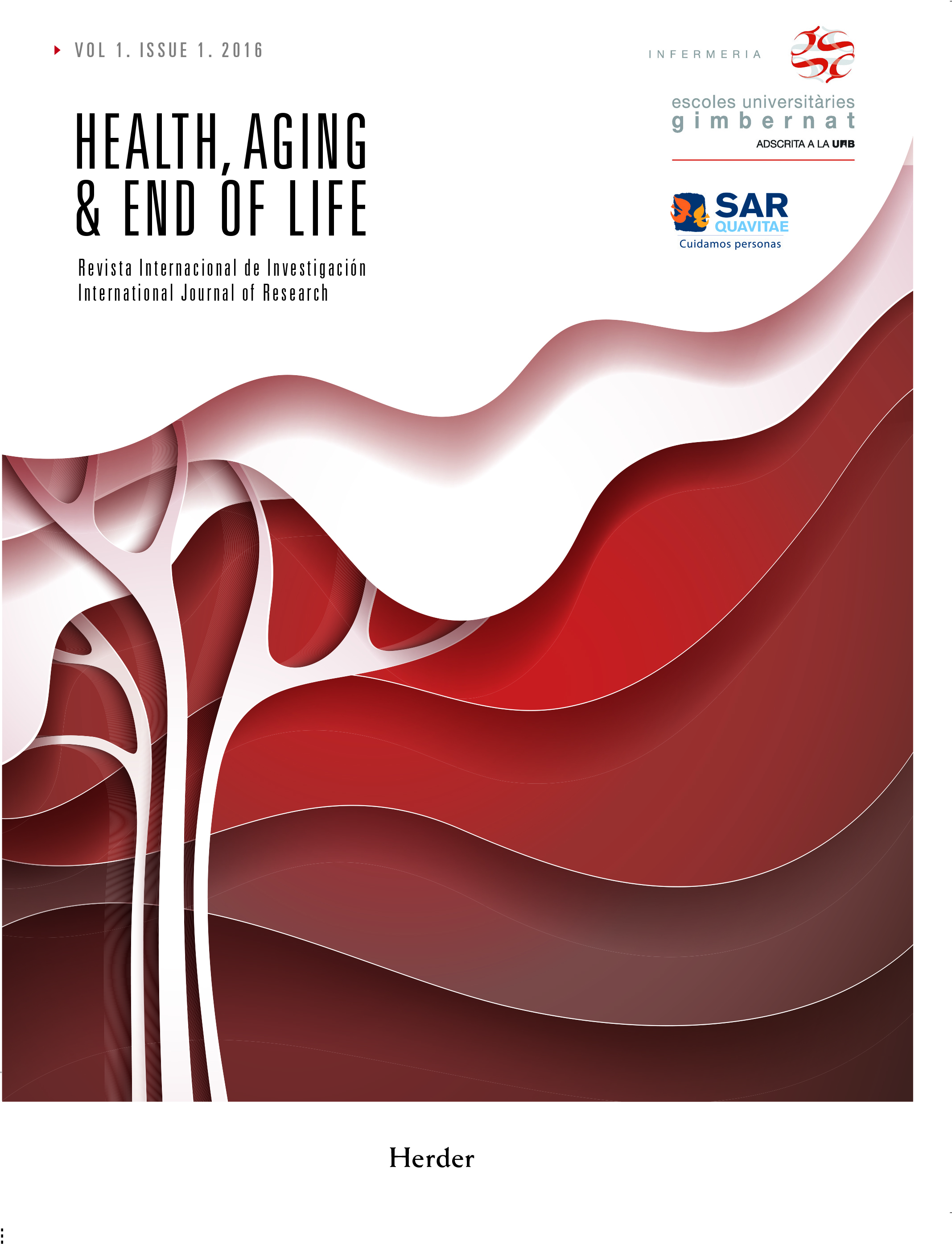Abstract
The use of arts based research methods is developing and began to develop in the field of health as a form of knowledge transfer in an effective and affective way to reach the convenient audience involved. This paper aims to identify examples of creative-artistic production of scientific results, both in general and in the specific topic of aging and / or end of life. Furthermore it presents and analyzes a short story created to disseminate among health professionals the results of a qualitative study about the meaning of good practices in home care to the elderly. Finally, reflections arising leave open the future discussion of alternatives to disseminate
science to society, which might be less known and transgressive but potentially valid.
References
Abba, K., Byrne, P., Horton, S. y Lloyd-Williams, M. (2013). Interventions to encourage discussion of end-of-life preferences between members of the general population and the people closest to them - a systematic literatura review. BMC Palliative Care, 12:40. doi:10.1186/1472-684X-12-40
Archibald, M.M., Caine, V., Scott, S.D. (2014). The development of a classification schema for arts-based approaches to knowledge translation. Worldviews Evidence Based Nursing. 11(5):316-24.
Bluebond-Langer, M. (1980). The private world of dying children. New Yersey: Princeton University Press.
Boydell, K., Gladstone, B.M., Volpe, T., Allemang, B. y Stasiulis, E. (2012). The Production and Dissemination of Knowledge: A Scoping Review of Arts-Based Health Research. FQS 13(1), Art. 32.
Cleary, L.M., y Peacock, T. (1997). Disseminating american indian educational research through stories: a case against academic discourse. JAIE. 37(1):7-15
Duncan, K.C., Salters, K., Forrest, J.I., Palmer, A.K., Wang, H., O’Brien, N., y Hogg, R.S. (2013). Cohort Profile: Longitudinal Investigations into Supportive and Ancillary health services. International Journal of Epidemiology, 42(4):947–955. doi:10.1093/ije/dys035
Frank, A. (1995). The wounded storyteller. Body, Illness and ethics. Chicago: The University of Chicago.
Gray, R. (2004). No longer a man: using ethnographic fiction to represent life history research. Auto/Biography 12:44-61
Harris, F.M., Kendall, M., Bentley, A., Maguire, R., Worth, A., Murray, S., Boyd, K., Brown, D., Kearney, N. y Sheikh, A. (2008). Researching experiences of terminal cancer: a systematic review of methodological issues and approaches. European Journal of Cancer Care. 17(4):377–386.
Healthtalkonline. http://www.healthtalk.org/. University of Oxford. Irwin, R. (2005). A/r/tography Retrieved January 15, 2013,from:http://m1.cust.educ.ubc.ca/Artography/
Izquierdo, M.D., Mahtani, V., Cerdeña, J., López, K. y Comisión mixta fomento de buenas prácticas (noviembre de 2013). Las buenas prácticas en la atención domiciliaria a personas dependientes: visión de los profesionales sanitarios. En 17th International Nursing Research Conference. Congreso llevado a cabo en Lleida, España.
Keen, S. y Todres, L. (2007). Strategies for disseminating qualitative research findings: three exemplars. FQS. 8(3). Art 17.
Knowles, J.C. y Cole, A.L. (Ed.). (2008). Handbook of the arts in qualitative research: perspective, methodologies, exemplars and issues. Thousand Oaks, CA: Sage.
Kontos, P.C. y Poland, B.D. (2009). Mapping new theoretical and methodological terrain for knowledge translation: contributions from critical realism and the arts. Implementation Science. 5, 4:1.
Lafrenière, D., Hurlimann, T., Menuz, V. y Godard, B. (2014). Evaluation of a cartoon-based knowledge dissemination intervention on scientific and ethical challenges raised by nutrigenomics/nutrigenetics research. Evaluation and Program Planning. 46:103-14.
Lohan, M., Aventin, Á., Oliffe, J.L., Han, C.S. y Bottorff, J.L. (2015). Knowledge Translation in Men’s Health Research: Development and Delivery of Content for Use Online. Journal of Medical Internet Research, 17(1):e31. doi:10.2196/jmir.3881
Mahtani, V. (2013). El silencio. En Historias fonendoscópicas. Varios autores. Santa Cruz de Tenerife. España. Colegio Oficial de Médicos de Santa Cruz de Tenerife.
Mahtani, V. (2010). Estudio cualitativo sobre la percepción del beneficio y del riesgo de ansiolíticos y antidepresivos en los usuarios (tesis doctoral). Departamento de Medicina Interna y Psiquiatría. Universidad de La Laguna.
Mills, S., Rosenberg, J. y Mills, J. (2015), PA13 The arts and end of life conversations: an innovative approach to health promotion in palliative care. BMJ Supportive y Palliative Care 5:A23 doi:10.1136/bmjspcare-2015-000906.73
Mulley, G. (2007). Myths of ageing. Clinical Medicine 7 (1):68-72. doi:10.7861/clinmedicine.7-1-68
Parsons, J.A., Boydell, K.M. (2012). Arts-based research and knowledge translation: some key concerns for health care professionals. Journal of interprofessional care. 26(3):170-2.
Rieger, K., Chernomas, W., McMillan, D., Morin, F. y Demczuk, L. (2015). The effectiveness and experience of arts-based pedagogy among undergraduate nursing students: a comprehensive systematic review protocol. The JIB database of systematic reviews and implementation reports, 13(2)
Rieger, K., Schultz, A.S. (2014). Exploring arts-based knowledge translation: sharing research findings through performing the patterns, rehearsing the results, staging the synthesis. Worldviews Evidence Based Nursing. 11(2):133-9.
Sandelowski, M., Trimble, F., Woodard, E.K. y Barroso, J. (2006). From synthesis to script: transforming qualitative research findings for use in practice. Qualitative Health Research. 16(10):1350-70.
Scott, S.D., Brett-MacLean, P., Archibald, M. y Hartling, L. (2013). Protocol for a systematic review of the use of narrative storytelling and visualarts- based approaches as knowledge translation tools in healthcare. Systematic Reviews, 2:19. doi:10.1186/2046-4053-2-19
Sells, D., Topor, A. y Davidson, L. (2004). Generating coherence out of chaos: examples of the utility of empathic bridges in phenomenological resarch. Journal of Phenomenological Psychology 35 (2):253-271
Smith, J.K. (2004). Representation, crisis of. En: Lewis-Beck, M.S., Bryman A. y Liao, T.F. (Eds.). The SAGE encyclopedia of social science research methods. Vol. 3:962-963 Thousand Oaks, CA: SAGE
Tarasoff, L.A., Epstein, R., Green, D.C., Anderson, S. y Ross, L.E. (2014) Using interactive theatre to help fertility providers better understand sexual and gender minority patients. Medical Humanities. 40(2):135-41.
Van Manen, M. (1997) From meaning to method. Qual Health Res, 7:345-69.

